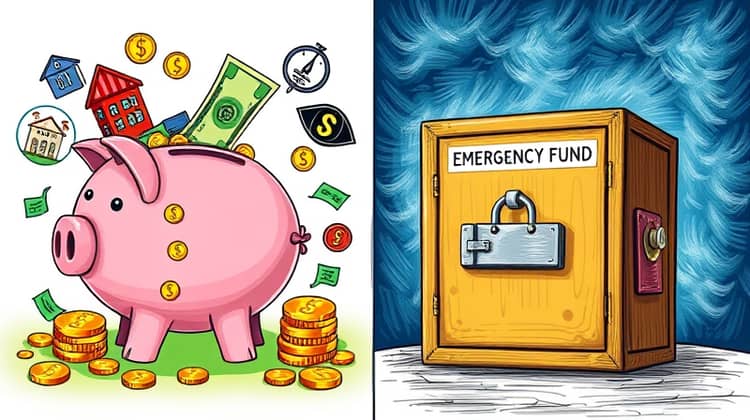Emergency Fund vs. Savings Account: What's the Best Choice for You?

Managing finances effectively is crucial for ensuring stability and security in our lives. One of the most common financial discussions revolves around whether to prioritize an emergency fund or a savings account. Understanding these two concepts is critical in making an informed decision that aligns with your financial goals.
In this blog post, we will delve into the differences between emergency funds and savings accounts, explore their importance, and provide guidance on how to choose the right options for your needs. Whether you're just starting your financial journey or looking to reorganize your finances, this article will provide valuable insights.
Understanding Emergency Funds

An emergency fund is a dedicated amount of money set aside to cover unexpected expenses that may arise, such as medical emergencies, car repairs, or job loss. Its primary purpose is to provide financial security and peace of mind during unforeseen circumstances.
Having an emergency fund in place allows you to handle unexpected financial shocks without resorting to high-interest debt options like credit cards or loans. It serves as a financial cushion, ensuring you can meet your essential needs during tough times.
- Designed specifically for unplanned expenses
- Typically recommends saving three to six months' worth of living expenses
- Should be easily accessible and kept in a liquid account like a savings account
Overall, an emergency fund is a vital component of a sound financial plan, acting as your safety net when life throws unforeseen challenges your way.
What is a Savings Account?

A savings account is a bank account that allows you to deposit money and earn interest on those deposits. It is primarily used for saving money over time while providing easy access to your funds when needed.
Savings accounts are typically less liquid than checking accounts but more liquid than other investment options. They can be ideal for saving toward specific goals, such as a vacation or a new car, while still offering some interest income.
- Provides interest on the deposited amount
- Encourages saving for specific financial goals
- Generally more flexible than emergency funds in terms of withdrawal
In essence, savings accounts are useful tools for managing your finances while earning some interest without the risk of capital loss.
Key Differences Between Emergency Funds and Savings Accounts

While emergency funds and savings accounts both serve the purpose of helping individuals manage their finances, they are different in a few significant ways. Understanding these differences is essential to effectively utilize your money based on your specific needs.
Emergency funds are geared towards financial emergencies, whereas savings accounts are designed for general savings purposes. Recognizing the intent behind each can help you allocate your funds more efficiently.
- Emergency funds are strictly for unforeseen circumstances; savings accounts can be for planned expenses.
- Emergency funds should contain enough to cover essential living expenses; savings accounts can hold varying amounts according to personal goals.
- Emergency funds typically require less frequent access while savings accounts are more flexible for regular withdrawal.
By identifying these distinctions, you can better structure your finances to ensure you are prepared for both everyday needs and unexpected financial events.
Why Having an Emergency Fund is Crucial

Having an emergency fund is not just a good idea; it's crucial for your financial well-being. Life can be unpredictable, and having a safety net allows you to navigate through difficult times without overwhelming stress.
In the face of sudden expenses, relying on savings or credit may not always be an optimal solution. An emergency fund provides immediate access to cash, enabling you to address urgent needs without delay, thereby promoting financial stability in your life.
Furthermore, the peace of mind that comes from knowing you have a financial buffer can reduce anxiety and allow you to focus on your long-term financial goals rather than worrying about short-term setbacks.
Benefits of a Savings Account

Savings accounts offer a range of benefits that can enhance your financial management strategies. One primary advantage is the ability to earn interest on your deposits, allowing your savings to grow over time.
In addition, savings accounts are usually insured by the Federal Deposit Insurance Corporation (FDIC) or similar organizations, protecting your funds up to a certain limit. This means that when you deposit your money, you can have peace of mind knowing your savings are secure from bank failures.
Finally, savings accounts can motivate individuals to set aside money for specific goals, making them more intentional with their savings habits.
Can a Savings Account Serve as an Emergency Fund?

A common question arises: can a savings account serve as an emergency fund? The quick answer is yes, but certain conditions must be met.
Using a savings account for your emergency fund can be practical if it provides easy access to your money while also offering a reasonable interest rate to help your savings grow.
Tips for Building an Emergency Fund

Building an emergency fund can feel daunting, but with a structured approach, it becomes more manageable. Start by setting a realistic goal based on your monthly expenses and target the total amount that you feel comfortable having saved up.
Next, consider automating your savings by setting up a direct deposit from your paycheck into a designated emergency fund account. This approach helps you save consistently without thinking too much about it.
- Begin with a smaller goal and gradually increase it as you save more
- Cut unnecessary expenses and funnel those savings into your emergency fund
- Review your savings progress regularly and adjust your contributions accordingly
By embracing these strategies, you can build a solid emergency fund and enhance your financial resilience, ready for whatever life may throw your way.
How to Choose the Right Savings Account

Selecting the right savings account is essential in maximizing your savings potential and in ensuring that you can meet your financial goals effectively. Begin by researching different banks and credit unions, comparing interest rates, fees, and withdrawal limits.
Look for accounts that offer minimal fees and favorable interest rates while also providing easy online access or mobile banking options. Additionally, consider factors such as customer service reputation and account requirements.
- Check interest rates to ensure your savings grow
- Look for no or low monthly fees
- Assess the accessibility of the account for easy transactions
Choosing the right savings account ensures that your money works for you while still being easily accessible for when the need arises.
Conclusion

In conclusion, both emergency funds and savings accounts hold significant value in managing personal finances. Each serves a unique purpose, and understanding their roles can greatly enhance your financial stability.
Creating an emergency fund is essential for protecting yourself from unexpected setbacks, while a savings account is invaluable for reaching specific financial goals. A balanced approach utilizing both can safeguard your needs and help you achieve your aspirations.






